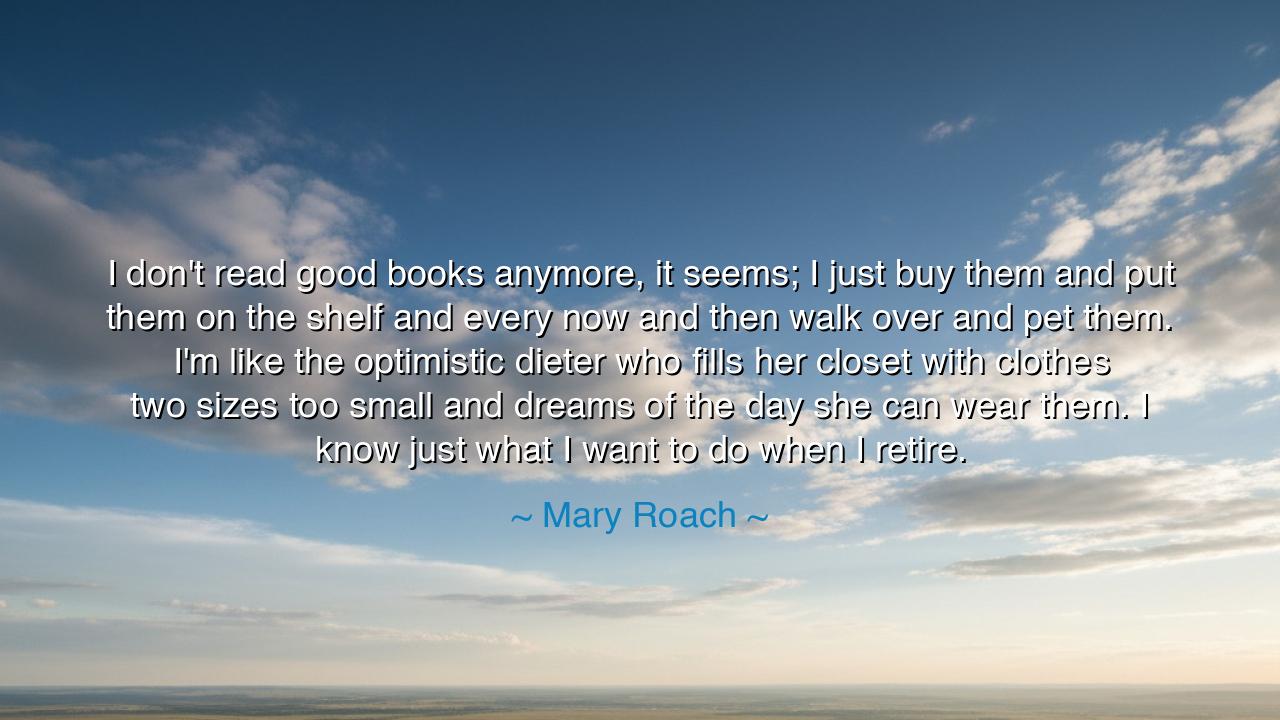
I don't read good books anymore, it seems; I just buy them and
I don't read good books anymore, it seems; I just buy them and put them on the shelf and every now and then walk over and pet them. I'm like the optimistic dieter who fills her closet with clothes two sizes too small and dreams of the day she can wear them. I know just what I want to do when I retire.






In the words of Mary Roach: “I don't read good books anymore, it seems; I just buy them and put them on the shelf and every now and then walk over and pet them. I'm like the optimistic dieter who fills her closet with clothes two sizes too small and dreams of the day she can wear them. I know just what I want to do when I retire.” What may sound at first like a humorous confession is in truth a reflection of a universal human tendency: the longing for possibility, the treasuring of potential, and the hope that one day the life we imagine will meet the life we live.
The books on the shelf are more than objects; they are promises. Each spine contains not only knowledge or story, but an unopened doorway into another world. To collect them, even unread, is to surround oneself with the whispers of wisdom, the companionship of voices waiting to be heard. Roach compares this habit to that of a dieter collecting smaller clothes, reminding us that humans often live not only in the present but in anticipation—we hold tokens of who we hope to become. The books and the clothes are symbols of a future self, imagined but not yet realized.
The ancients, too, knew this longing. The Library of Alexandria, filled with scrolls from across the known world, was less a place of constant reading and more a monument to potential knowledge. Few could ever read its entirety, but the presence of those works proclaimed: humanity aspires to more than it can consume. So too does the individual, building shelves of unread books, silently declare: “I will one day be wiser, fuller, transformed.” This aspiration itself carries dignity, even when deferred.
Roach’s words also reveal the tension between desire and time. The modern world overwhelms us with tasks, duties, distractions, until even the act of reading a good book becomes a luxury postponed. Yet the longing remains, just as the dieter longs to fit into the smaller dress. This tension is ancient as well. Cicero wrote that if you have a garden and a library, you have everything you need. Yet even he, in his political struggles, surely found moments where the library stood silent while the affairs of Rome consumed his days. The human heart is always torn between now and someday.
But in her jest, Roach also offers hope. For she declares: “I know just what I want to do when I retire.” This is the voice of one who has not abandoned her dream, but merely delayed it. Retirement becomes not merely the cessation of labor but the beginning of fulfillment. It is a reminder that the seeds of joy can be planted long before they bloom. Just as the farmer stores grain for the winter, so too do we store unread books, unworn clothes, unfulfilled plans, awaiting the season when they may finally come alive.
The meaning of this quote, then, is not despair at neglect, but the recognition that hope itself sustains us. Even when unread, books inspire. Even when unworn, clothes motivate. Even when delayed, dreams give shape to the horizon. We are creatures who live not only in what we do, but in what we desire to do, and that desire carries us forward through seasons of duty, toil, and distraction.
The lesson for us is clear: cherish both your aspirations and your actions. Do not be ashamed of the books on your shelf, for they are symbols of your hunger to grow. But also, whenever possible, choose to act now—read a page, taste a moment of your dream, for life is fleeting, and someday is never guaranteed. Balance the patience of hope with the urgency of the present.
Thus, Mary Roach’s humorous reflection becomes a teaching of the ancients: possibility is a treasure, but fulfillment is the crown. Surround yourself with symbols of who you wish to be, but do not wait too long to become that person. For in the end, wisdom is not only in collecting the books, but in opening them; not only in dreaming of the day, but in living it—today.






AAdministratorAdministrator
Welcome, honored guests. Please leave a comment, we will respond soon